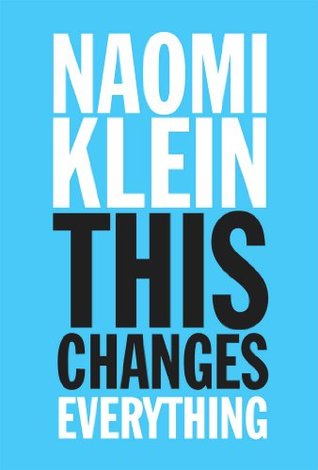More on this book
Community
Kindle Notes & Highlights
by
Naomi Klein
Read between
April 10 - April 22, 2016
sudden climate brake and steering failure
Finding new ways to privatize the commons and profit from disaster is what our current system is built to do;
The British psychoanalyst and climate specialist Sally Weintrobe describes this as the summit’s “fundamental legacy”—the acute and painful realization that our “leaders are not looking after us . . . we are not cared for at the level of our very survival.”
After a rare decline in 2009 due to the financial crisis, global emissions surged by a whopping 5.9 percent in 2010—the largest absolute increase since the Industrial Revolution.
we have not done the things that are necessary to lower emissions because those things fundamentally conflict with deregulated capitalism,
The three policy pillars of this new era are familiar to us all: privatization of the public sphere, deregulation of the corporate sector, and lower corporate taxation, paid for with cuts to public spending.
our economic system and our planetary system are now at war. Or, more accurately, our economy is at war with many forms of life on earth, including human life.
What the climate needs to avoid collapse is a contraction in humanity’s use of resources; what our economic model demands to avoid collapse is unfettered expansion.
unleashing a new stage of neocolonial plunder layered on top of the most plundered places on earth (as journalist Christian Parenti documents so well in Tropic of Chaos).
For a long time, environmentalists spoke of climate change as a great equalizer, the one issue that affected everyone, rich or poor. It was supposed to bring us together. Yet all signs are that it is doing precisely the opposite, stratifying us further into a society of haves and have-nots, divided between those whose wealth offers them a not insignificant measure of protection from ferocious weather, at least for now, and those left to the mercy of increasingly dysfunctional states.
“a causal link between the quest for cheap and disciplined labor power and rising CO2 emissions.”
logic that is willing to work laborers to the bone for pennies a day will burn mountains of dirty coal while spending next to nothing on pollution controls because it’s the cheapest way to produce. So when the factories moved to China, they also got markedly dirtier. As Malm points out, Chinese coal use was declining slightly between 1995 and 2000, only for the explosion in manufacturing to send it soaring once again. It’s not that the companies moving their production to China wanted to drive up emissions: they were after the cheap labor, but exploited workers and an exploited planet are, it
...more
it requires visionary long-term planning, tough regulation of business, higher levels of taxation for the affluent, big public sector expenditure, and in many cases reversals of core privatizations
new, nonprofit disaster insurance programs so that people who have lost everything to a hurricane or a forest fire are not left at the mercy of a private insurance industry that is already adapting to climate change by avoiding payouts and slapping victims with massive rate increases.
the roughly 500 million richest of us on the planet are responsible for about half of all global emissions. That would include the rich in every country in the world, notably in countries like China and India, as well significant parts of the middle classes in North America and Europe.
it is not that “we” are broke or that we lack options. It is that our political class is utterly unwilling to go where the money is (unless it’s for a campaign contribution), and the corporate class is dead set against paying its fair share.
this research makes clear, the most significant cause of rising emissions is not the reproductive behavior of the poor but the consumer behaviors of the rich.
“It’s often claimed, particularly by those who’d like to see it rebooted, that the Green Revolution saved the world from hunger,” sociologist Raj Patel, author of Stuffed and Starved, told me. “The problem is that even with the Green Revolution, starvation continues—particularly in India, where the revolution was most intense. Hunger isn’t about the amount of food around—it’s about being able to afford and control that food. After all, the U.S. has more food than it knows what to do with, and still 50 million people are food insecure.”
about 12 percent of the world’s power is currently supplied by nuclear energy,
Thomas Piketty’s Capital in the Twenty-First Century, exposing the built-in structures of ever-increasing wealth concentration, can sit atop bestseller lists for months,
all of us are living in the world that neoliberalism built, even if we happen to be critics of neoliberalism.


